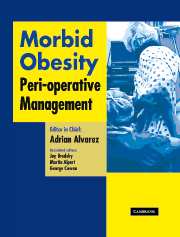Book contents
- Frontmatter
- Contents
- Contributors
- Foreword
- Preface
- Acknowledgments
- Dedication
- Section 1 General aspects
- Section 2 Pathophysiology
- 4 Lung physiology
- 5 Cardiac morphology and ventricular function
- 6 Pathophysiology of cardiovascular co-morbidities
- 7 Physiological changes during laparoscopy
- 8 Digestive physiology and gastric aspiration
- Section 3 Pre-operative management
- Section 4 Peri-operative management of co-morbidities
- Section 5 Pharmacology
- Section 6 Monitoring
- Section 7 Intra-operative management
- Section 8 Post-operative care
- Section 9 Conclusions
- Afterword
- Index
4 - Lung physiology
from Section 2 - Pathophysiology
Published online by Cambridge University Press: 17 August 2009
- Frontmatter
- Contents
- Contributors
- Foreword
- Preface
- Acknowledgments
- Dedication
- Section 1 General aspects
- Section 2 Pathophysiology
- 4 Lung physiology
- 5 Cardiac morphology and ventricular function
- 6 Pathophysiology of cardiovascular co-morbidities
- 7 Physiological changes during laparoscopy
- 8 Digestive physiology and gastric aspiration
- Section 3 Pre-operative management
- Section 4 Peri-operative management of co-morbidities
- Section 5 Pharmacology
- Section 6 Monitoring
- Section 7 Intra-operative management
- Section 8 Post-operative care
- Section 9 Conclusions
- Afterword
- Index
Summary
Introduction
Clinicians taking care of morbidly obese patients need to be aware of the significant physiologic changes that obesity is associated with. There are several unique changes in pulmonary function that lead to reduced lung volumes, increase work of breathing, and alterations in control of breathing and gas exchange. However, it has to be emphasized that most of the obesity-associated changes in pulmonary function have great variability and may not necessarily correlate with weight or body mass index (BMI). Dyspnea and exercise intolerance are common complains among obese patients, as well as the prevalence of certain disorders such as asthma, obstructive sleep apnea and the obesity-hypoventilation syndrome. In addition, obese individuals are at increased risk of developing certain complications such as atelectasis, aspiration, ventilatory failure and pulmonary embolism in the post-operative state. This chapter will describe the important physiologic changes in the respiratory system associated with obesity and describe briefly the pathologic consequences that can derive from them. A summary of these changes is shown in Table 4.1.
Alterations in pulmonary function
Alteration in lung mechanisms
Compared to non-obese individuals, morbid obesity is associated with an increase in the total work of breathing of about 70% and a 4-fold increase in the energy or oxygen cost of breathing.
- Type
- Chapter
- Information
- Morbid ObesityPeri-Operative Management, pp. 45 - 58Publisher: Cambridge University PressPrint publication year: 2004



